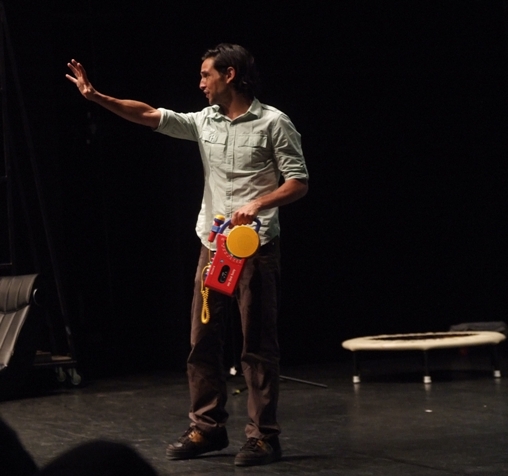
Director Stéphane Bittoun is between cultures – yet gives the impression of being connected to them all. Growing up in Germany with an Algerian-French-Jewish father and a German mother, the multi-lingual director has a strong connection to Israel, coming here for the first time in the mid-70s and just about every year since. Family, theatre and intercultural dialogue all play a part in his most recent visit this past June for the performance My First Sony at the Cameri Theatre in Tel Aviv, which he describes as “A very personal intimate project in many ways,” adding that he was, “Excited to come with it to Israel.”
The performances of My First Sony at the Cameri were made possible by the Goethe Insitute and Georg Blochman, who was involved at a very early stage in the process. Bittoun says, “From the moment he read my concept a bit more than 2 years ago, Georg Blochmann helped a lot – not only financially, but motivating me, believing in me. His enthusiasm was inspiring, powerful and very precious to me.”
Bittoun adapted and directed this production based on the novel by Israeli author Benny Barbash, which was originally produced at the Mounsturm Theatre in Frankfurt. Bittoun arrived in Tel Aviv with the original cast who performed the play in German, with Hebrew subtitles.
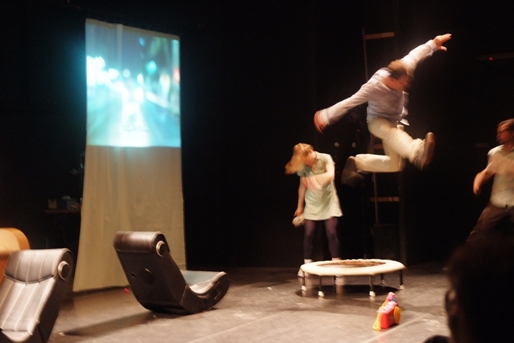
The play centers around the life of a ten year old boy Yotam and the life of his family as recorded on the bright red Sony recorder his writer father has given him. Bittoun worked with a small cast of five actors who portrayed Yotam, his parents, older brother Shaul and little sister Na’ama, while also stepping into other parts – grandparents, police, hecklers and Dad’s girlfriend, as needed. These changes often took place instantly, onstage – with the smallest of gestures, shift in body language and tone. It is a fast-paced, very physical production with every element contributing to the whole. The set design is minimal, yet ingenious: shower curtains are by turn a video screen, a camping tent, and even shower curtains. The deep armchairs create the feeling of a family living room, yet their wheels transform them easily into a child’s toy or in one somber moment – a wheelchair. The effects are many, yet the interplay between the actors onstage, recorded dialogue and video segments enhances the emotional message of the play.
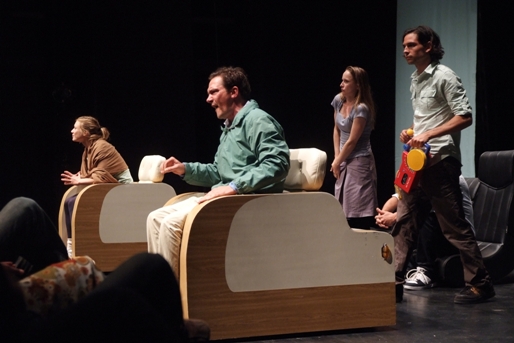
What was perhaps most striking about the performance at the Cameri was the strange feeling of seeing a German cast portray a Tel Aviv family and feeling that it is the most natural thing in the world.
Bittoun took some time from his busy schedule in Israel to talk to Midnight East about My First Sony and theatre in general.
His directing style includes elements that are less common in Israel, like having an actor dub his voice over another actor talking in a scene, and he describes his approach to acting as “not psychological in the traditional sense.” Yet this does not imply that it is not connected to the emotions. To a certain extent he even describes the different characters in My First Sony, “the women as well as the men, as a kind of alter ego.”
Bittoun says “I work a lot on words, the way they speak, the rhythms, which is here [in Israel] maybe less heard because it is not your language. For me the rhythm makes the mood, the psychology. You don’t have to necessarily cry to make me – the audience, understand that now it is going to be sad. But maybe someone is talking – pa pa pa pa pa pa [he sounds out an energetic rhythm and then suddenly stops and is silent for a moment before continuing] and then this break, makes you hold on and then you get goose bumps, just from the rhythm, and not from this pretending…the acting which is based on pretending something.”
Bittoun studied acting and directing at Justus-Liebig-University Giessen, which is known for combining modern theatre theory with practice. He describes it as “very open, not like classical acting school.” Students from all disciplines studied together and studied the different disciplines – dance, voice, acting, and filmmaking. Bittoun even studied Indian classical dance. Although he began his career as an actor, Bittoun says, “At some point I decided I wanted to create my own visions, my own worlds.” He spent some time writing and directing for television, an early evening program of crime stories. While that seems far removed from the kind of theatre work Bittoun is involved in now, he says that although “I knew this is not art” he feels he benefitted from this experience: “In theatre you have more time, in television you learn to make decisions.”
His connection to My First Sony is very personal in many ways. Bittoun first visited Israel as a child in 1975 – 76, and from then on visited his French-Algerian family in Israel almost every year. He even speaks some Hebrew, saying “People tell me that I have a French accent. I captured the family language; this is the Hebrew I got to know. I have family here, I feel connected to this country. In way I feel in between… I grew up in Germany; I had matzot in my schoolbag. I was a Jew, and here, of course, I am a European. My father is Jewish, not my mother, so there is the whole…[he pauses here, alluding to the religious issue – according to Jewish law, a child is Jewish only if his mother is Jewish] I always wanted to do a play connected with Israel.”
When he read My First Sony [in German translation] he says, “It sucked me in. Until today I cannot read aloud the end. It kills me.”
When I ask him about the differences between the responses of German and Israeli audiences to the play, Bittoun replies that the play was very well received in Germany and audiences could relate to the characters and the family story. He said, “In Germany people identify with the Seder scene, it’s the same as Christmas. There is a nice dinner and everything is fine until the fights begin. I identify with Yotam, he is the storyteller in between all of it, understanding and documenting it.”
Bittoun particularly likes the way that the play conveys everyday life in Israel, even in the way that it refers to central issues, such as the Holocaust, which enters the play because the father, an out of work writer, begins to help survivors write their memoirs in order to earn some money, as Bittoun puts it “a simple, everyday reason.” However, the audiences responses do differ in some dimensions. One of the scenes “the Scheherezade story” describes a woman who invents a hidden family treasure in order to ensure her survival during the Holocaust, continues to look for the treasure after the war is over, even though she knows it does not exist.
“People in Israel laugh,” says Bittoun, “it is tragic, but it is also funny. In Germany – no one laughed, they don’t dare. I want them to dare. There is still tension on both sides… I think both sides are a bit stuck. Now my actors, they are between 30 – 40 years old, this is what is happening [during their stay in Israel] they meet people…not sticking to the fact that they are from Germany, not denying the past, but forming new relationships.”
AYELET DEKEL



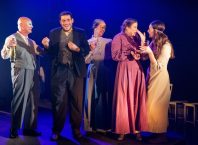
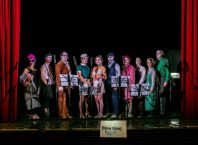
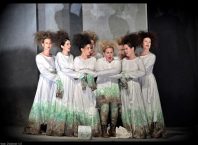
There were three performances in June at the Cameri, and that is all that is planned for the moment. For everyone who didn’t have the opportunity to see the play – the article is a glimpse into the creative world of Bittoun – from whom we hope to see more theatre work in Israel.
It seems very interesting. Weren’t the representations in June? Why a new article now, are they gonna perform again?
Comments are closed.